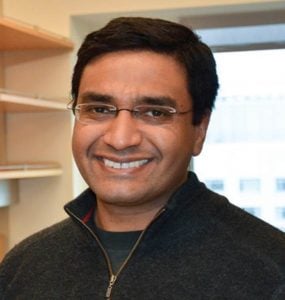 Name of Institution:
Name of Institution:
Oregon Health & Science University
Project Title:
In vivo imaging of Lewy pathology & neurodegeneration in a mouse model of Parkinson’s disease
Investigator:
Vivek Unni, MD, PhD
Since 2011, Dr. Unni has served as an assistant professor in the Parkinson Center of Oregon, the Department of Neurology and the Jungers Center for Neurosciences Research at Oregon Health & Science University (OHSU) in Portland. He is a physician-scientist caring for people impacted by Parkinson’s Disease and conducting basic scientific Parkinson’s Disease research. Dr. Unni has undergraduate and master’s degrees from Stanford University and earned his MD, PhD from Columbia University. He completed his internship at St Luke’s–Roosevelt Hospital, and his neurology residency and fellowship in movement disorders at the Harvard Partners-Brigham & Women’s Hospital and Massachusetts General Hospital (MGH) programs. Dr. Unni served on the faculty at Harvard Medical School and was a staff neurologist in the Movement Disorders Division of the MGH Neurology Department.
Research Objectives and Relevance to Diagnosis/Treatment of PD:
The objective of this research is to test the hypothesis that intracerebral injection of alpha synuclein fibrils leads to their neuronal uptake and juxtanuclear transport, where fibrils directly nucleate the formation of Lewy pathology by self-templating endogenous alpha synuclein.
Recent work suggests that Lewy pathology may form by the spread of specific fibril aggregate alpha synuclein forms from cell-to-cell. This is referred to as the “prion-like” propagation hypothesis, based on some similarities to rapidly progressively, universally fatal neurodegenerative conditions known as prion diseases. The crux of the prion-like propagation hypothesis involves “self-templating,” where abnormally folded alpha synuclein directly binds normally folded forms and converts them into an aggregated form like itself. A critical prediction of the prion-like hypothesis is that exogenously applied alpha synuclein fibrils must enter neurons and directly self-template endogenous, normally-folded forms into Lewy inclusions. Although there is evidence that this kind of self-templating can occur in certain experimental systems, whether this occurs in human brains during Parkinson’s Disease is not known.
Dr. Unni’s lab has pioneered a powerful in vivo multiphoton imaging approach to visualize alpha synuclein within individual neurons in the living mouse brain with high resolution over months. With this approach, Dr. Unni has characterized the development of Lewy pathology in vivo in individual animals and neurons over time. This proposal will test the specific “prion-like” propagation hypothesis for alpha synuclein aggregation spreading, in order to guide development of approaches that halt this process and create potential new therapies for PD.
2016 Progress Update:
Our research is focused on understanding, at the cellular level, how the protein alpha synuclein initially aggregates, spreads, and leads to the death of neuronal cells in PD. Over the course of our 2016 funding, we developed a protocol that allows us, for the first time, to visualize and manipulate the transport of the protein alpha synuclein in the living brain using an animal model and powerful imaging techniques. We found that aggregated forms of alpha synuclein are able to travel long distances in the brain, initially in axonal structures, and lead to the formation of Lewy pathology in neuroanatomically connected areas in our animal model. Our results provide initial evidence to support our hypothesis that aggregated forms of alpha synuclein are taken up by neurons and are transported from cell to cell, leading to continued development of Lewy pathology. The goal of our future research is to use the tools we have developed to understand the mechanism of how aggregated forms of alpha synuclein are transported from cell to cell throughout the nervous system in order to rationally intervene to stop and/or reverse the process. Dr. Unni was awarded the George C. Cotzias Fellowship in 2016-2017 to continue his research.
